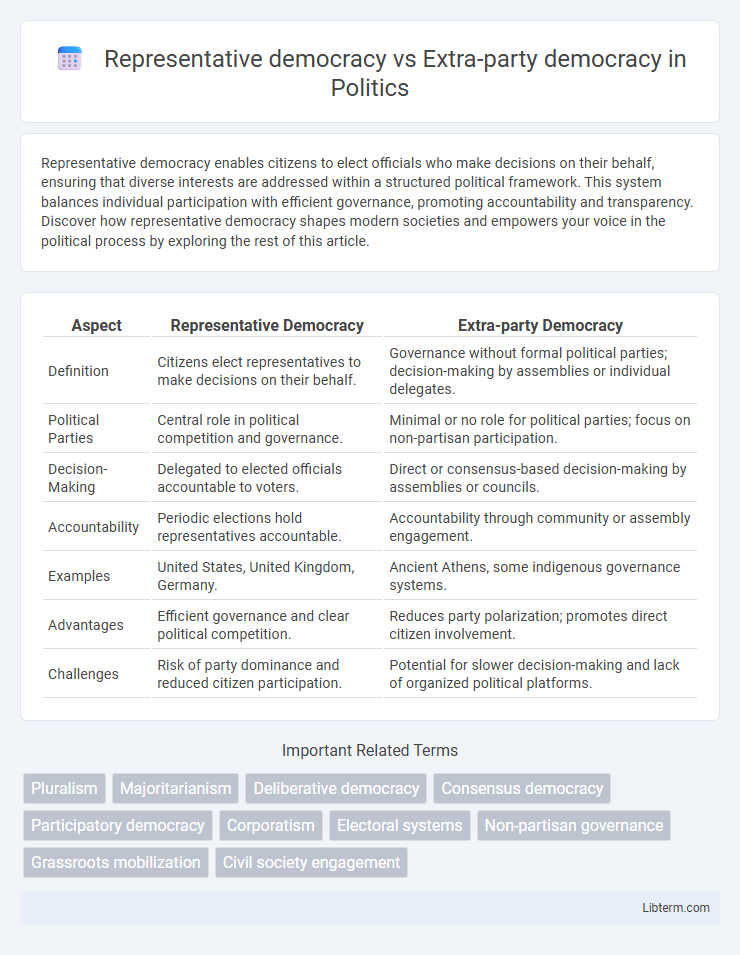Representative democracy enables citizens to elect officials who make decisions on their behalf, ensuring that diverse interests are addressed within a structured political framework. This system balances individual participation with efficient governance, promoting accountability and transparency. Discover how representative democracy shapes modern societies and empowers your voice in the political process by exploring the rest of this article.
Table of Comparison
| Aspect | Representative Democracy | Extra-party Democracy |
|---|---|---|
| Definition | Citizens elect representatives to make decisions on their behalf. | Governance without formal political parties; decision-making by assemblies or individual delegates. |
| Political Parties | Central role in political competition and governance. | Minimal or no role for political parties; focus on non-partisan participation. |
| Decision-Making | Delegated to elected officials accountable to voters. | Direct or consensus-based decision-making by assemblies or councils. |
| Accountability | Periodic elections hold representatives accountable. | Accountability through community or assembly engagement. |
| Examples | United States, United Kingdom, Germany. | Ancient Athens, some indigenous governance systems. |
| Advantages | Efficient governance and clear political competition. | Reduces party polarization; promotes direct citizen involvement. |
| Challenges | Risk of party dominance and reduced citizen participation. | Potential for slower decision-making and lack of organized political platforms. |
Understanding Representative Democracy
Representative democracy operates through elected officials who make decisions on behalf of the citizens, ensuring accountability and political participation within a structured framework. Unlike extra-party democracy, which minimizes or excludes formal political parties, representative democracy relies on pluralistic party competition to reflect diverse public interests and maintain governmental legitimacy. Key features include regular elections, rule of law, and institutional checks that safeguard citizens' rights and promote transparent governance.
Defining Extra-party Democracy
Extra-party democracy is a political system where governance and decision-making occur outside traditional party structures, emphasizing direct citizen participation and nonpartisan mechanisms. Unlike representative democracy, which relies heavily on elected party officials to create and enforce legislation, extra-party democracy promotes inclusivity through decentralized authority and often employs mechanisms like referendums, citizen assemblies, and consensus decision-making. This model seeks to reduce partisan polarization and enhance accountability by involving citizens more actively in policy development beyond party lines.
Historical Evolution of Both Systems
Representative democracy emerged in the 18th century with the American and French revolutions, emphasizing elected officials acting on behalf of citizens to ensure accountability and rule of law. Extra-party democracy, often linked to single-party or dominant-party states, evolved primarily in the 20th century, especially within socialist or authoritarian regimes where political plurality was limited to maintain centralized control and ideological unity. Both systems reflect distinct responses to governance challenges: representative democracy stressing political pluralism and periodic elections, while extra-party democracy focuses on stability and cohesion through restricted political competition.
Core Principles Compared
Representative democracy is characterized by elected officials who act on behalf of citizens, emphasizing accountability, political pluralism, and regular, competitive elections as core principles. Extra-party democracy, often exemplified by systems limiting or excluding political parties, prioritizes direct citizen participation, nonpartisan governance, and consensus-driven decision-making processes. Both systems aim to reflect public will but diverge fundamentally in the role of political parties, with representative democracy relying on party competition and extra-party democracy focusing on broader civic involvement without party influence.
Mechanisms of Citizen Participation
Representative democracy primarily enables citizen participation through periodic elections, allowing voters to choose representatives who make decisions on their behalf, while maintaining accountability via legislative processes and public consultations. Extra-party democracy emphasizes direct citizen engagement mechanisms such as referendums, citizen assemblies, and participatory budgeting, reducing reliance on political parties to facilitate decision-making. Both systems seek to enhance democratic legitimacy, but differentiate in the scope and immediacy of citizen influence on policy outcomes.
Role of Political Parties in Governance
In representative democracy, political parties play a central role by organizing elections, forming government coalitions, and shaping policy agendas through party platforms. Extra-party democracy minimizes or excludes political parties, often relying on individual leaders or non-partisan mechanisms to govern, reducing party influence in political decision-making. The governance structure in representative democracy promotes accountability and ideology-driven representation, whereas extra-party systems may prioritize consensus or technocratic leadership over partisan competition.
Accountability and Transparency
Representative democracy ensures accountability through elected officials who are responsible to voters and subject to regular elections, fostering transparency via public debates and accessible government records. Extra-party democracy emphasizes accountability by promoting citizen participation outside traditional party structures, often relying on direct mechanisms like referendums and grassroots oversight to maintain transparency. Both systems seek to balance power by different means, with representative democracy institutionalizing accountability and transparency, while extra-party democracy encourages decentralized civic engagement.
Decision-Making Processes
Representative democracy centralizes decision-making through elected officials who deliberate and enact policies based on constituent interests and legislative frameworks. Extra-party democracy emphasizes direct citizen involvement in decision-making, often through referenda, grassroots initiatives, or consensus-based assemblies, reducing reliance on formal party structures. Both systems shape policy outcomes by balancing the roles of elected representatives and direct public participation in governance.
Advantages and Drawbacks
Representative democracy offers efficient decision-making by electing officials to act on behalf of citizens, ensuring accountability through regular elections and safeguarding minority rights. However, it risks political elitism and voter disengagement, with representatives potentially prioritizing party interests over public welfare. Extra-party democracy promotes direct civic participation and reduces partisan conflicts, but it may face challenges in achieving coherent policy direction and sustaining long-term governance stability.
Future Prospects and Global Trends
Representative democracy continues to dominate global political systems, with increasing emphasis on digital participation and transparency to enhance citizen engagement and accountability. Extra-party democracy, exemplified by non-partisan or leader-centric governance models, gains traction in regions seeking stability amid rising polarization and distrust in traditional parties. Future trends indicate a hybridization of these systems, integrating technological innovations and civic movements to balance centralized authority with broader public involvement.
Representative democracy Infographic

 libterm.com
libterm.com